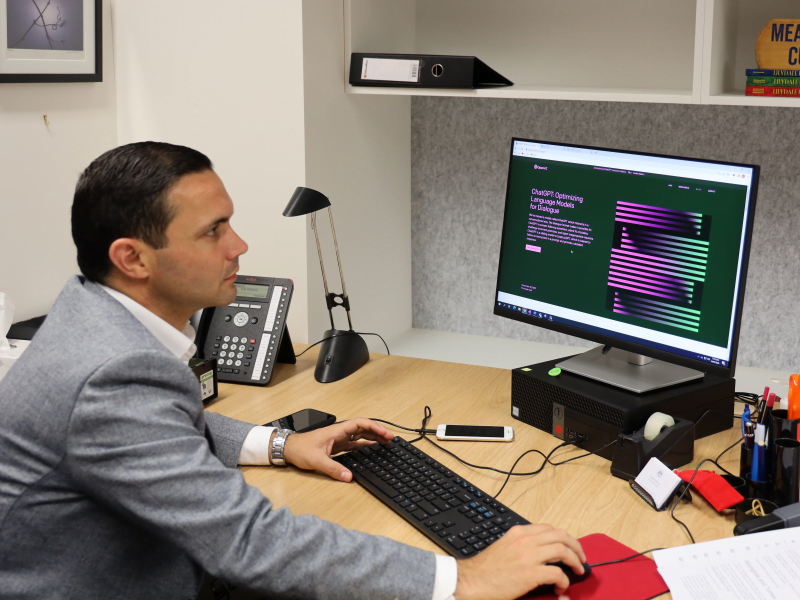A parliamentary technological assessment office to enhance and coordinate Australian tech policy should be established, according to digital economy observer and Liberal backbencher Aaron Violi.
In an interview with InnovationAus.com, the Liberal member for Casey proposes that the body would provide analysis of the potential impact of emerging technologies to parliamentarians.
It would be independently staffed like the parliamentary budget office (PBO) and help to close the gap between the pace of technological progress and the general slow design process for legislation and regulation.

Mr Violi said the office should be based on the United Kingdom’s Parliamentary Office of Science and Technology (POST), established in 1992, and the former (1974-1995) United States’ Congressional Office of Technology Assessment, which many have called to be reinstated, including 2019 Democratic Presidential Candidate Senator Elizabeth Warren.
At the time, Ms Warren said “lobbyists are filling in the gaps in congressional resources and expertise by providing Congress information from the perspective of their paying corporate clients. So let’s fix it”.
POST “produces impartial, non-partisan, and peer-reviewed briefings, designed to make scientific research accessible to the UK Parliament”, according to its website. A similar Parliamentary Office for Scientific and Technological Assessment, established in 1983, also exists in France.
Mr Violi, formerly head of partnerships Asia Pacific for social food ordering app Ritual.co, believes the policy costings focused PBO shouldn’t take on this additional function.
“The parliamentary budget office would still look at the economics, this would be a group that focused on the technical implications of the technology…[for example] ChatGPT has been developed, this is how it’s being used now, and this could be some of the long term societal implications,” Mr Violi said.
“I believe that you need to keep the functions separate. If the technological assessment office provides the expertise or the possible implications, that can then feed into the [costings] because they are different skill sets… I think it can complement the PBO without cutting across it.”
When asked about what framework of analysis the office should adopt, Mr Violi said he would prefer the office consider opportunities and threats across three broad themes. He added that these are just first principles and that his proposal “is about starting the conversation”.
“I would see it as broadly covering societal impacts [including mental health and wellbeing], national security and cybersecurity, and economic opportunities… I believe it’s an important conversation that we should be having about [whether] an office like this is valuable, and then those questions of what would it actually do?”
Recent research published by the Australian National University’s Tech Policy Design Centre highlights the need for greater tech policy coordination. The report proposed a Tech Policy Coordination Office, citing POST as one of several precedents, which would serve “as a steward of the tech policy ecosystem and single entry and referral point for external stakeholders”, according to the centre’s founding director Professor Johanna Weaver.
It would sit within the Department of Prime Minister and Cabinet, to facilitate participation by industry, academia, civil society, consumer groups, and like-minded international partners in tech policy design, and reduce information asymmetries.
Mr Violi was one of the first members of parliament, alongside Labor backbencher Julian Hill, to use ChatGPT to write a section of a speech delivered in parliament. He also recently called on his Coalition colleagues in a joint party room meeting to begin considering the public policy implications of the generative AI tool.
While he deferred from suggesting particular regulatory proposals for ChatGPT, Mr Violi stressed the need for greater coordination on digital issues to InnovationAus.com including through the appointment of a federal digital minister.
“[We’re seeing] different states feeling the need to pick up the slack and this is an issue. This is technology that impacts all states equally, and it’s something that the federal government, I believe, should take a lead on to make sure we’ve got coordination across the country and in partnership where its required,” he said.
“Obviously education primarily sits with the states, but the federal government, in my mind, should be coordinating all states on education, as one example, to make sure that we’re actually coming up with the best response and there’s a unified response across the board so it’s as efficient as possible.
“Having a minister who’s actually reviewing all of this within a framework [of a digital strategy] and supported by an independent assessment office that’s really at the cutting edge of what’s happening in academia and in monitoring global trends, it would allow parliament to be more advanced.”
Do you know more? Contact James Riley via Email.

